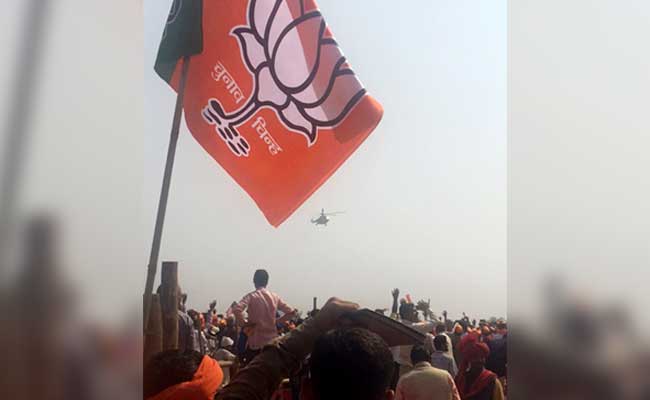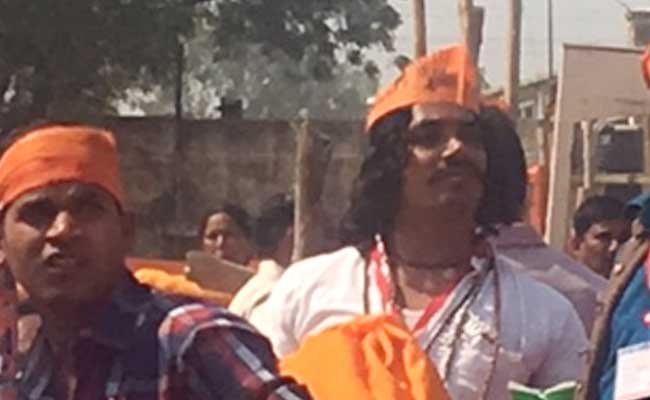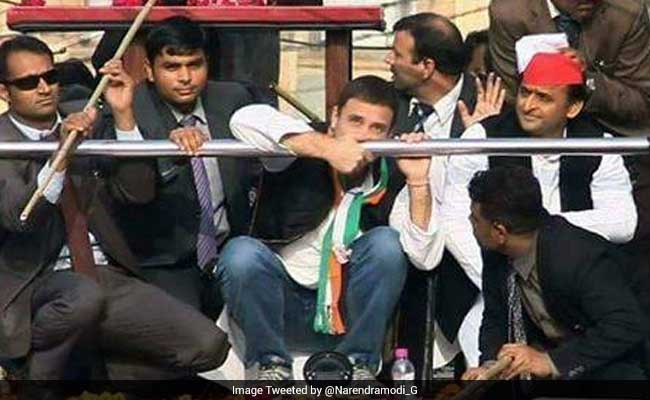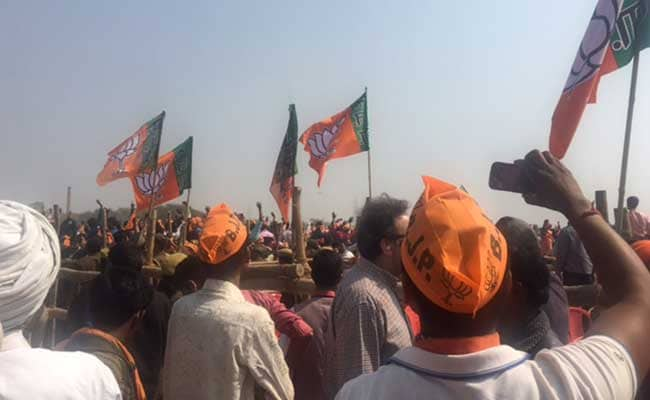UP Election 2017: Thousands of people gathered in Fatehpur to hear Prime Minister Narendra Modi
Fatehpur, Uttar Pradesh:
Among the young men who have gathered to watch Prime Minister Narendra Modi at Fatehpur, personal grooming is prominent. Some wear their hair in long styled locks, at least a few were dandies with bouffants. Aviators or imitations of them were trending. Before they sat on the dusty red plastic chairs spread out everywhere, they wiped them gingerly, fussing about their white kurtas or jeans. Everyone had a cellphone. Everyone took selfies.
The sun was blasting down. At regular intervals, the young men stood on the chairs, craning their necks, awaiting the PM's helicopter. Patience, urged the warm-up acts on the stage. The breeze was a fair-weather ally.
 When the helicopter began its descent, the PM's arrival was filmed by thousands of cellphone cameras, being waved high in the air. Everyone was on their chairs. "Modi, Modi" - the chant reached higher as if to meet the helicopter, lowering steadily.
When the helicopter began its descent, the PM's arrival was filmed by thousands of cellphone cameras, being waved high in the air. Everyone was on their chairs. "Modi, Modi" - the chant reached higher as if to meet the helicopter, lowering steadily.
PM Modi spoke for about an hour. On television this morning, he said, he saw Chief Minister Akhilesh Yadav talking to reporters after voting in Lucknow. "He started by saying he would win this election, needed no partner. Then, when it became clear that both his party and his to-be ally's were sinking, he decided to tie up, and said the partnership would win. Today, I heard him say he will be the single-largest party. Kya hua, bhaiya?" he taunted. "We are only on Round 3 (of voting). Already you are sounding like the game is up."
 The PM did not refer to Rahul Gandhi, the Chief Minister's wingman for this election. But with considerable take-down finesse, he exhibited two political lineaments: a punishing appraisal of Mr Gandhi and feeding off popular social media topics. So he referred to the much-forwarded image of Akhilesh Yadav and Rahul Gandhi at their roadshow in Agra, with the Congress vice-president bending to avoid a tangle of electricity wires as he rode on a Mercedes SUV with the Chief Minister.
The PM did not refer to Rahul Gandhi, the Chief Minister's wingman for this election. But with considerable take-down finesse, he exhibited two political lineaments: a punishing appraisal of Mr Gandhi and feeding off popular social media topics. So he referred to the much-forwarded image of Akhilesh Yadav and Rahul Gandhi at their roadshow in Agra, with the Congress vice-president bending to avoid a tangle of electricity wires as he rode on a Mercedes SUV with the Chief Minister.
"One ducked as he usually does," the PM said. "As for Akhilesh Yadav, he didn't need to - he knew the line is dead because there is no electricity anywhere." It was a crowd-pleaser.
 Despite the unremitting heat, the crowd stayed attentive. The PM stopped regularly to take off his glasses and wipe his face.
Despite the unremitting heat, the crowd stayed attentive. The PM stopped regularly to take off his glasses and wipe his face.
The loudest bursts of approval came when the PM declared "Aap ka pyar mere saraakhon par", seeking their blessing, and later, when he highlighted his achievement in getting the rich to surrender their entitlement of subsidising cooking gas and ensuring free cylinders for the poor, recalling his mother's toiling in a kitchen. By experience, not by empathy, I understand you, he said, deriding the previous Congress-led government for failing to introduce the not basic corrections in a system skewed towards the rich.
He spoke of delivering jobs for the youth of Uttar Pradesh, jobs for which they would need no connections, have to pay no bribes. "We will not privilege one caste above another," he said, in an election being closely watched to gauge if the caste calculus is shelved, as it was in 2014, for the promise of employment, development and economic empowerment. Implicating Akhilesh Yadav for minority appeasement, the PM said all religions must be treated equally. "If villages create graveyards, there must be crematoriums too. If there is bijli (electricity) for Ramzan, it must be there for Diwali. There must be bijli on both Holi and Eid."
 When he talked of providing cheaper medicines and urea, he launched a theme, one that he kept returning to, with rewarding dividends: "The people who were selling them on the black market, won't they come after me? Won't they punish me? Who will protect me?"
When he talked of providing cheaper medicines and urea, he launched a theme, one that he kept returning to, with rewarding dividends: "The people who were selling them on the black market, won't they come after me? Won't they punish me? Who will protect me?"
"We will, we will," the crowd roared back, some of the young pounding the air with their fists.
At no point did he mention Mayawati - perhaps an allowance for an alliance, if needed, after the election, or a wish to avoid alienating the vast Dalit population.
It was at the very end that the PM brought up the notes ban, "the electric shock of November 8" that has "forced the rich to account for every paisa" in banks. In a handshake to the traders, a long-time support group of the BJP, PM Modi said it is not the "small shopkeeper he over-charges a little or holds back a little from the government" that is the problem. "It is the rich, the powerful, the corruption that we will settle accounts with" he pledged.
"And when they come for me, when they work to defeat me, who will protect me?" he asked. Through row after row, in a body electric, the answer rang out: "we will, we will."
The sun was blasting down. At regular intervals, the young men stood on the chairs, craning their necks, awaiting the PM's helicopter. Patience, urged the warm-up acts on the stage. The breeze was a fair-weather ally.

UP Election 2017: PM Narendra Modi's arrival was filmed by thousands on their cellphone cameras
PM Modi spoke for about an hour. On television this morning, he said, he saw Chief Minister Akhilesh Yadav talking to reporters after voting in Lucknow. "He started by saying he would win this election, needed no partner. Then, when it became clear that both his party and his to-be ally's were sinking, he decided to tie up, and said the partnership would win. Today, I heard him say he will be the single-largest party. Kya hua, bhaiya?" he taunted. "We are only on Round 3 (of voting). Already you are sounding like the game is up."

UP Election 2017: Supporters at PM Narendra Modi's rally in Fatehpur tried to look their best.
"One ducked as he usually does," the PM said. "As for Akhilesh Yadav, he didn't need to - he knew the line is dead because there is no electricity anywhere." It was a crowd-pleaser.

The image of Rahul Gandhi and Akhilesh Yadav ducking to avoid wires was shared widely on social media.
The loudest bursts of approval came when the PM declared "Aap ka pyar mere saraakhon par", seeking their blessing, and later, when he highlighted his achievement in getting the rich to surrender their entitlement of subsidising cooking gas and ensuring free cylinders for the poor, recalling his mother's toiling in a kitchen. By experience, not by empathy, I understand you, he said, deriding the previous Congress-led government for failing to introduce the not basic corrections in a system skewed towards the rich.
He spoke of delivering jobs for the youth of Uttar Pradesh, jobs for which they would need no connections, have to pay no bribes. "We will not privilege one caste above another," he said, in an election being closely watched to gauge if the caste calculus is shelved, as it was in 2014, for the promise of employment, development and economic empowerment. Implicating Akhilesh Yadav for minority appeasement, the PM said all religions must be treated equally. "If villages create graveyards, there must be crematoriums too. If there is bijli (electricity) for Ramzan, it must be there for Diwali. There must be bijli on both Holi and Eid."

UP Election 2017: People gathered at PM Narendra Modi's Fatehpur rally took many selfies
"We will, we will," the crowd roared back, some of the young pounding the air with their fists.
At no point did he mention Mayawati - perhaps an allowance for an alliance, if needed, after the election, or a wish to avoid alienating the vast Dalit population.
It was at the very end that the PM brought up the notes ban, "the electric shock of November 8" that has "forced the rich to account for every paisa" in banks. In a handshake to the traders, a long-time support group of the BJP, PM Modi said it is not the "small shopkeeper he over-charges a little or holds back a little from the government" that is the problem. "It is the rich, the powerful, the corruption that we will settle accounts with" he pledged.
"And when they come for me, when they work to defeat me, who will protect me?" he asked. Through row after row, in a body electric, the answer rang out: "we will, we will."
Track Latest News Live on NDTV.com and get news updates from India and around the world

